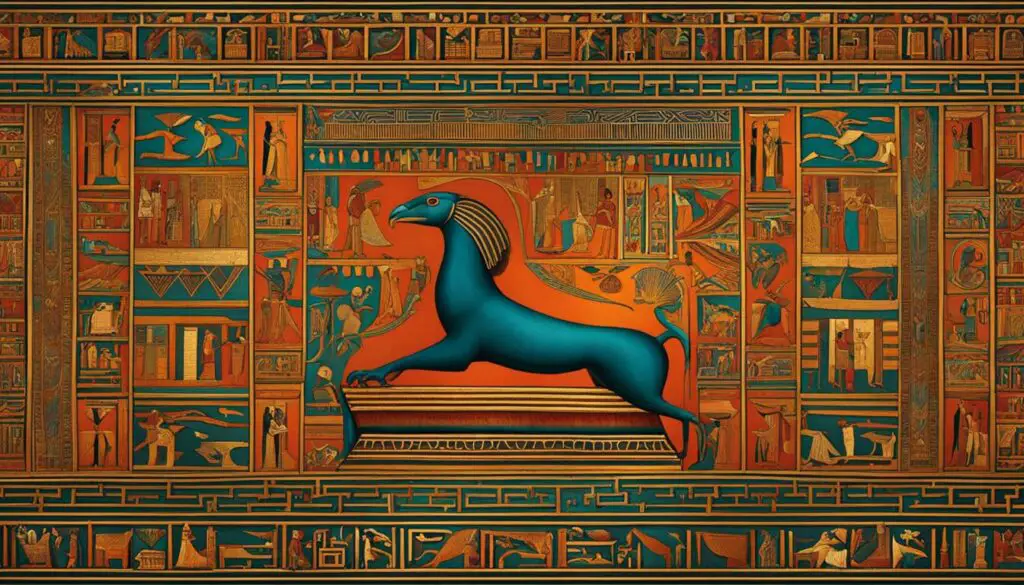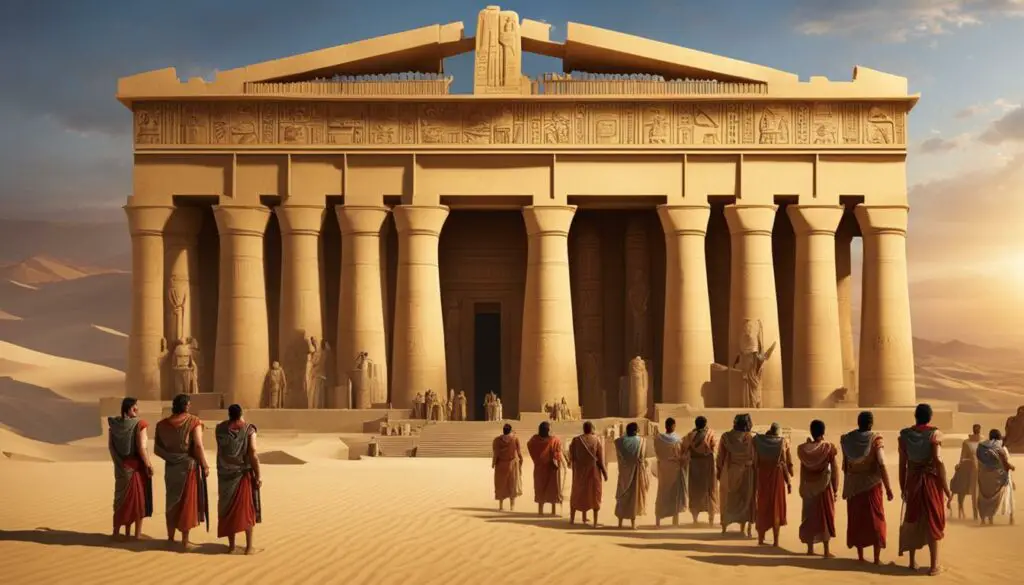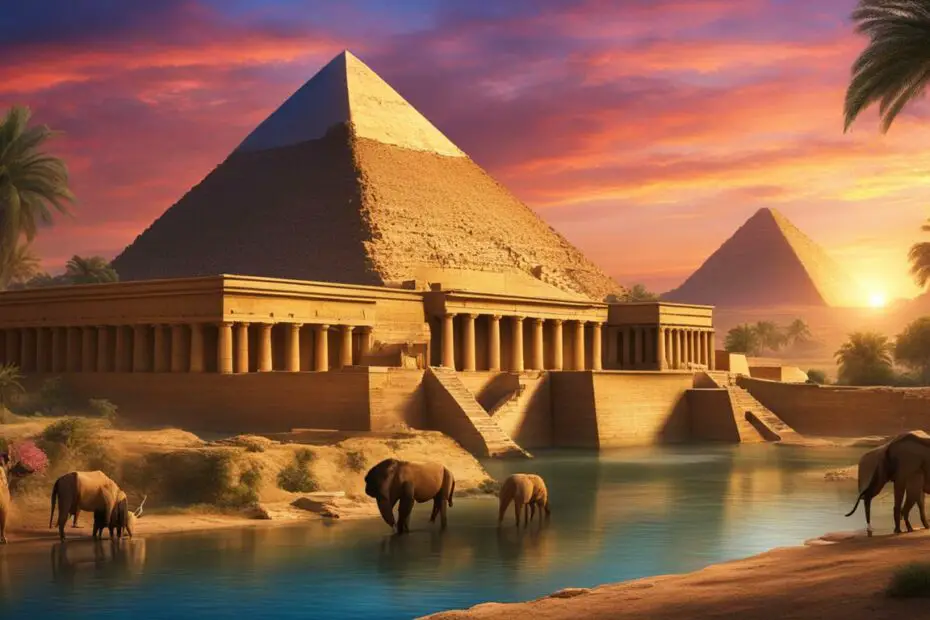Egypt’s influence on ancient Greek culture is a topic that has fascinated historians and scholars for centuries. The cultural exchange between these two ancient civilizations shaped the development of Greek society as we know it. From religion to art, trade to language, the impact of Egypt on ancient Greece’s cultural development cannot be overstated.
The early Greeks, such as the Mycenaeans and Minoans, were among the first to import Egyptian culture during the Bronze Age. Egyptian hieroglyphics were introduced to the mainland Greeks, marking the beginning of their writing system. This exchange laid the foundation for future interactions and set the stage for the profound influence that Egypt would have on Greek culture.
During the Greek Dark Ages, contacts between Egypt and Greece were renewed, leading to the establishment of Greek colonies in Egypt. This led to the influence of Egyptian art and philosophy on Greece. Greek figurines and statues reflected the artistic influence of Egypt, and the philosophical ideas of Greece were enriched by their interactions with Egyptian thought.
The Hellenistic period brought further merging of Greek and Egyptian cultures as the Greeks, under the rule of the Macedonians, conquered Egypt. Greek became the lingua franca, and Greek rulers adopted Egyptian traditions. This period marked a significant shift in power and further solidified the influence of Egypt on Hellenistic Greece.
The impact of Egypt on ancient Greek culture continues to be felt to this day. The adoption of Egyptian ideas and philosophies by the Greeks shaped the foundations of Western thought. The deciphering of the Egyptian language through Greek translations preserved a wealth of Egyptian culture and stories, contributing to our understanding of ancient history. The art and architecture of ancient Egypt continue to inspire contemporary artists and architects.
The cultural intermixing between Egypt and Greece left a lasting mark on both societies and is an essential part of understanding the development of Western civilization.
Early Contacts: Minoans and Egyptian Culture
The first contacts between Egypt and Greece can be traced back to the Minoans, an early precursor to Greek civilization. Although the influence of Egyptian culture on the Minoans is still debated, there is evidence that writing and religious practices from Egypt made their way to Crete, where they integrated into Minoan culture. One significant impact was the adoption of Egyptian hieroglyphics by the mainland Greeks, which became their first form of writing. While the long-term influence may not have been extensive, these early cultural exchanges set the stage for future interactions between Egypt and Greece.

The adoption of Egyptian hieroglyphics by the Greeks marked a pivotal moment in the development of Greek civilization. By borrowing this writing system, the Greeks were able to convey complex ideas and record information, thereby laying the foundation for their own literary and historical traditions. This exchange of knowledge and cultural practices between the Minoans, Egyptians, and mainland Greeks foreshadowed the profound impact that Egypt would have on ancient Greek culture as the centuries unfolded.
The Influence of Egypt on Classical Greece
During the Classical Era, the Greeks and Egyptians renewed their contacts, leading to a profound cultural intermixing between the two civilizations. Greek colonies were established in Egypt, such as Naucratis, serving as hubs for trade and cultural exchange. The impact of Egypt on ancient Greek culture can be observed in various aspects, including Greek figurines and statues, Archaic Greek philosophy, and the overall emergence of a shared cultural identity.
Greek Figurines and Egyptian Statues
Evidence suggests that Greek figurines and statues were influenced by Egyptian art during this era. One notable example is the sculpture known as the “Kouros,” which depicted ideal youth and displayed similarities with Egyptian statues in terms of pose and form.
Here is an example of how Greek figurines and Egyptian statues influenced one another:
| Greek Figurines | Egyptian Statues |
|---|---|
| Adoption of idealized human form | Depiction of gods and pharaohs |
| Sculptures made of marble or bronze | Sculptures made of stone, often limestone |
| Focus on symmetry and proportion | Emphasis on symbolic gestures and stylized poses |
Impact of Egypt on Archaic Greek Philosophy
The cultural intermixing between Greece and Egypt during this period also influenced the development of Archaic Greek philosophy. The Greek creation story aligns with the Egyptian concept of Ma’at, which emphasizes stability, order, and the opposing forces of chaos. The belief in cosmic harmony and the pursuit of wisdom were fundamental aspects of both Egyptian and Greek philosophical thought.
Furthermore, many Greek philosophers traveled to Egypt to study, gaining insights into Egyptian mathematics, astronomy, and religious practices. Notable figures like Thales incorporated their knowledge of Egyptian mathematics into Greek philosophy, expanding the foundations of early Greek thought.
Cultural Intermixing between Greece and Egypt
The cultural intermingling between Greece and Egypt during the Classical Era went beyond art and philosophy. Greek and Egyptian societies borrowed elements from one another, resulting in an enriched cultural tapestry. This exchange led to the adoption of Egyptian religious practices, architectural designs, and even clothing styles by the Greeks.
Here are some examples of cultural intermixing between Greece and Egypt:
- Egyptian religious rituals being incorporated into Greek religious ceremonies
- Egyptian architectural elements, such as obelisks, influencing Greek temple designs
- Greek adoption of Egyptian clothing, including the use of linen garments
This cultural intermixing not only created a shared cultural identity but also laid the groundwork for future artistic, philosophical, and political developments in both Egypt and Greece.
Overall, the influence of Egypt on ancient Greek culture during the Classical Era cannot be understated. The exchange of ideas, artistic styles, and philosophical concepts between these two civilizations played a significant role in shaping the development of Western civilization as we know it today.
Egyptian Influence on Hellenistic Greece
The Hellenistic period witnessed a significant merging of Greek and Egyptian cultures as a result of the Greek conquest of Egypt under the rule of the Macedonians. With the establishment of the Greek Ptolemaic Dynasty, Greek became the lingua franca in the newly formed Egyptian state. To assimilate with the local population, Greek rulers identified themselves as Pharaohs and displayed respect for Egyptian gods. This blending of cultures had a profound impact on language and cultural practices during this era.
Bilingualism became increasingly prevalent in Egypt, with a rising number of scribes and documents being written in both Greek and Egyptian Coptic. This linguistic duality proved invaluable in the preservation of Egyptian culture and stories. In fact, it was through Greek translations that 19th-century linguists were able to decipher the Egyptian language and unlock the wealth of knowledge it contained.
The Greek influence on Hellenistic Egypt is also evident in various cultural practices adopted by the Greeks during this period. The fusion of Greek and Egyptian architecture, art, and religious traditions created a unique syncretism that endured for centuries. Temples, palaces, and statues bore the influence of both Greek and Egyptian styles, demonstrating the aesthetic intermingling of the two cultures.
Moreover, the Hellenistic rulers’ adoption of Egyptian customs and titles further solidified the amalgamation of Greek and Egyptian culture. The continued use of Egyptian hieroglyphs and the assimilation of Egyptian deities into the Greek pantheon exemplify this cultural synthesis.
The impact of Egyptian influence on Hellenistic Greece can be best depicted through a table:
| Aspects of Cultural Influence | Description |
|---|---|
| Greek as the Lingua Franca | Greek became the primary language spoken in Egypt, bridging the linguistic gap between the Greek ruling elite and the local population. |
| Merging of Greek and Egyptian Religious Practices | Greek rulers adopted Egyptian titles and worshiped Egyptian gods, resulting in the incorporation of Egyptian religious traditions into Greek culture. |
| Bilingualism and Preservation of Egyptian Culture | The use of both Greek and Egyptian Coptic in written records allowed for the preservation and deciphering of the Egyptian language and cultural heritage. |
| Fusion of Greek and Egyptian Architecture | The architectural styles of Greece and Egypt merged, resulting in unique structures that combined elements from both cultures. |
| Syncretism in Art and Aesthetics | Greek and Egyptian artistic traditions fused, creating a distinctive visual language that incorporated elements from both cultures. |
The Egyptian influence on Hellenistic Greece played a significant role in shaping the cultural landscape of the era, leaving a lasting impact that continues to be felt to this day. The blending of Greek and Egyptian cultures during this period enriched both societies and contributed to the further development of Western civilization.

Mutual Literary Exchange
The passion for literature was a shared characteristic of both Egypt and Greece. While Greek literature emerged later, it quickly expanded and encountered Egyptian literary traditions. Greeks settling in Egypt would have encountered Egyptian literature that was being written and performed, especially in the Demotic form of the Egyptian language. Some Egyptian works were even translated into ancient Greek, and Greek writers may have adapted Egyptian genres or models for their own works. The exchange of literary ideas likely influenced both Egyptian and Greek literature, with Greek writers like Herodotus encountering Egyptian traditions, even in oral form, as early as the 5th century BC. The mutual influence of literature between Egypt and Greece continued into the Hellenistic and Roman periods, leaving a lasting impact on both cultural traditions.
Cultural Exchange of Literary Ideas
- Greek settlers in Egypt encountered Egyptian literature, especially in the Demotic form of the Egyptian language.
- Some Egyptian works were translated into ancient Greek, allowing Greek audiences to engage with Egyptian stories and ideas.
- Greek writers, such as Herodotus, were exposed to Egyptian literary traditions, which likely influenced their own works.
- The exchange of literary ideas between Egypt and Greece continued throughout the Hellenistic and Roman periods, contributing to the development of both cultures.
| Greek Influence on Egyptian Texts | Egyptian Influence on Greek Writers |
|---|---|
| Greek settlers in Egypt brought their own literary traditions, which may have influenced the development of Egyptian texts. | The encounters with Egyptian literature likely inspired Greek writers to incorporate Egyptian themes and storytelling techniques in their works. |
| Greek translations of Egyptian works allowed Greek audiences to access and appreciate Egyptian literature. | Egyptian literary traditions, such as the oral tradition and religious narratives, may have influenced the works of Greek writers. |
| Greek writers in Egypt may have adapted Egyptian literary genres or models to create their own unique literary works. | The exposure to Egyptian literature may have influenced the writing style and themes of Greek writers, expanding the richness of Greek literary tradition. |
The mutual exchange of literary ideas between Greece and Egypt played a significant role in shaping the literature of both cultures. Greek influence on Egyptian texts and Egyptian influence on Greek writers resulted in a vibrant literary tradition that incorporated themes, techniques, and storytelling elements from both civilizations.
Egypt’s Lasting Impact on Modern Society
The cultural intermixing between Egypt and Greece has had a lasting impact on modern society. Through the exchange of ideas and philosophies, Egypt influenced the development of Western thought, shaping the foundations of our modern civilization. One significant contribution was the deciphering of the Egyptian language through Greek translations, which preserved an entire world of Egyptian culture and stories that continue to fascinate and inspire people today.
Ancient Egyptian art and architecture also played a crucial role in shaping the visual legacy of modern society. The influence of Egyptian designs and aesthetics can be seen in contemporary art and architecture, as elements from ancient Egypt have been incorporated into modern artistic practices. The grandeur and symbolism of Egyptian monuments and artworks continue to captivate audiences around the world, showcasing the enduring impact of Egypt on our modern cultural landscape.
Understanding the influence of Egypt on ancient Greek culture is not simply a historical curiosity but an essential component of comprehending the development of Western civilization. The cultural interplay between Egypt and Greece has left an indelible mark on our society, manifesting through language, art, and philosophy, and highlighting the interconnectedness of cultures throughout history.
FAQ
How did Egypt influence ancient Greek culture?
Egypt had a profound impact on ancient Greek culture through the exchange of religion, culture, and trade. Ancient Greeks adopted Egyptian hieroglyphics as their first form of writing and were influenced by Egyptian art, philosophy, and literature. The conquest of Egypt by the Hellenistic Macedonians further merged Greek and Egyptian cultures, leaving a lasting mark on both societies.
What was the influence of Egypt on Minoan and Mycenaean cultures?
The influence of Egyptian culture on the Minoans and Mycenaeans is still a topic of debate among historians. However, evidence suggests that early cultural exchanges between Egypt and Greece set the stage for future interactions. Importing Egyptian culture during the Bronze Age introduced writing and religious practices to the Greeks, laying the foundation for cultural exchange.
How did Egypt influence Classical Greek art and philosophy?
The Greeks and Egyptians renewed their contacts during the Classical Era, resulting in the establishment of Greek colonies in Egypt and the influence of Egyptian art and philosophy on Greece. Greek figurines and statues showed similarities to Egyptian art, and the Egyptian concept of Ma’at, emphasizing stability and order, influenced Greek philosophical theories. Greek philosophers also traveled to Egypt to study, further contributing to the cultural intermixing between the two civilizations.
How did the Greek conquest of Egypt impact both cultures?
The Greek conquest of Egypt resulted in a fusion of Greek and Egyptian cultures during the Hellenistic period. Greek became the common language used in the new Egyptian state and Greek rulers adopted Egyptian traditions. Bilingualism became prevalent, with scribes and documents written in both Greek and Egyptian Coptic. The influence of Egypt on Hellenistic Greece is evident in the language and cultural practices adopted during this period.
What was the mutual literary exchange between Greece and Egypt?
The passion for literature was shared by both Egypt and Greece. Greek settlers in Egypt encountered Egyptian literature, and some Egyptian works were even translated into ancient Greek. Greek writers may have adapted Egyptian genres or models for their own works. The exchange of literary ideas likely influenced both Egyptian and Greek literature, leaving a lasting impact on both cultural traditions.
How did Egypt’s influence on ancient Greek culture impact modern society?
The cultural intermixing between Egypt and Greece has had a lasting impact on modern society. The adoption of Egyptian ideas and philosophies by the Greeks shaped the foundations of Western thought. The deciphering of the Egyptian language through Greek translations preserved an entire world of Egyptian culture and stories. The influence of Egypt on ancient Greek culture is an essential part of understanding the development of Western civilization.
